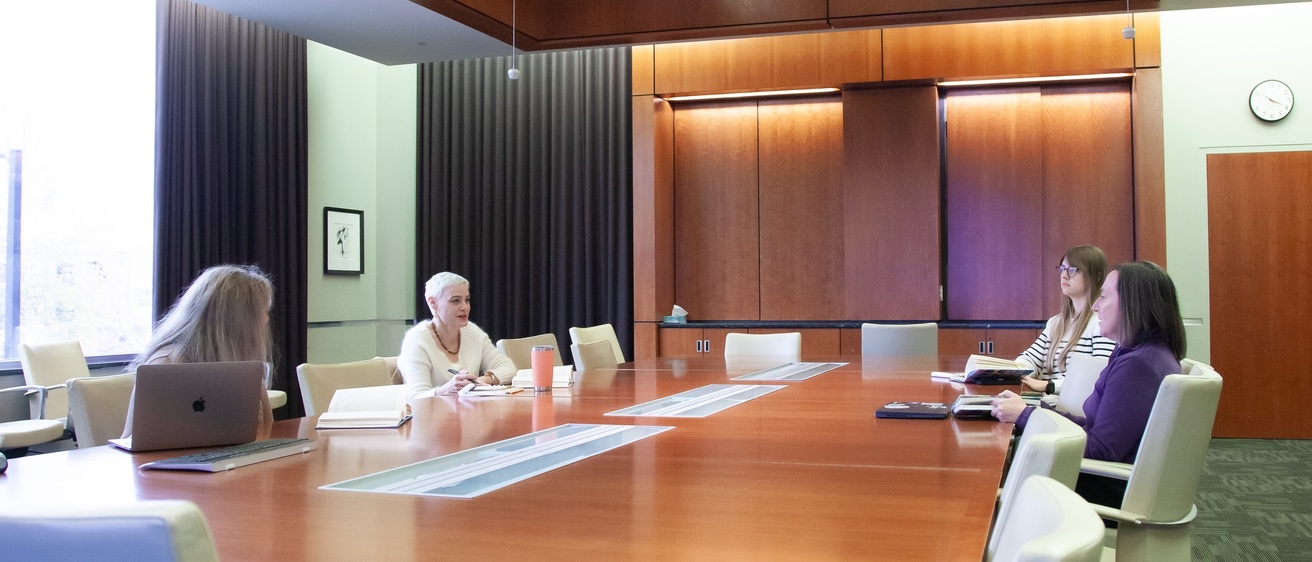The foundational premise of Faculty Learning Communities (FLCs) and Communities of Practice (CoPs) is that learning is socially situated. Both FLCs and CoPs are facilitated by faculty scholar-practitioners in the Center for Teaching and contribute to teaching and learning excellence.
CoPs are dedicated to developing each instructor’s knowledge around a shared domain of practice, while FLCs also facilitate the production, dissemination, and use of evidence-based practice (Cox and McDonald, 2016).
Joining a Faculty Community
If you are interested in joining a faculty community or learning more about its topic and process, you can contact that community's faculty leaders and liaison which are listed below.
Please contact the Center for Teaching if you have general questions about faculty communities.
Current CoPs
Explore our Communities of Practice to connect with faculty members and staff around shared teaching interests, goals, and challenges.
Data-Informed Teaching
This CoP meets to explore student data available to UI faculty with two goals: 1) identify barriers to student learning and 2) generate solutions to implement at the course or program level.
- CoP faculty co-facilitators: Adam Brummett, Alexandra Nica, and Priscilla Williams
- Center for Teaching staff liaison: Sara Nasrollahian
- Research and Analytics staff liaison: Salim George
Current FLCs
Explore our current Faculty Learning Communities or connect with us to discuss forming a new FLC.
Scholarship of Teaching and Learning (SoTL)
This FLC provides a place for faculty to learn about SoTL, support each other in pursuing SoTL, and discuss ways to make it more visible.
- FLC faculty leaders: Maggie Chorazy and Alexandra Nica
- Center for Teaching staff liaison: Allie Brandriet
Elevate Your Teaching with High-Impact Practices
This Faculty Learning Community (FLC) provides a collaborative space where educators come together to explore, implement, and reflect on evidence-based strategies that enhance student engagement and learning experience.
- FLC faculty leader: Anna Jensen
- Center for Teaching staff liaison: Sara Nasrollahian
Register to be a founding member.
Other Elements
Assessing Impact
One critical component of this work is assessment, which measures and understands the impact of the FLC or CoP. The Center for Teaching uses assessment frameworks that facilitate faculty member’s understanding of the changes in their process (e.g., their teaching practice) and also represent changes in institutional culture. One model of authentic assessment for these communities includes participants in the design of assessment strategies and criteria and addresses the learning that is important to participants (Hubball et al., 2004).
Structure and Process
- Two to three faculty members serve as leaders of each faculty community. Leaders are invited to attend a leaders’ coffee session at the beginning of the academic year to share ideas and get support.
- FLCs and CoPs often begin the academic year by sharing short readings to jump-start discussion.
- Faculty communities meet at least three times per semester; some choose to meet as frequently as every three weeks.
- The goals, discussions, content, agendas, and outcomes develop iteratively throughout the academic year.
Funding and Support
- The Center for Teaching liaison provides expertise in the form of literature recommendations, thought partnering, and collaboration for FLCs and CoPs.
- Administrative staff can provide additional support for meeting scheduling as needed.
- Funding from the Center for Teaching can provide books to spark discussion during FLC meetings, enable FLC members to attend relevant community events, invite speakers, or participate in working dinners.
Previous Learning Communities
- Student Research Teams
- Community Engaged Research
- Playing with Education: Gamifying the Classroom
- Transparent Assignment Design
- Experiential Education
- Assessing Assessment to Enhance Student Motivation
- Community-Engaged Teaching and Research
- Cognitive Support for Student Learning
- Excellence in Engineering Education
- Generative AI in Teaching
- Faculty Mentoring
